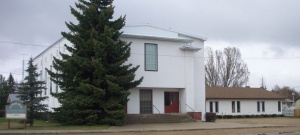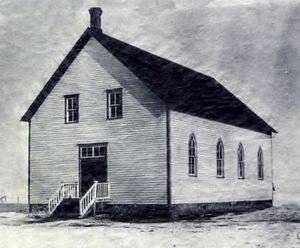North Star Mennonite Church (Drake, Saskatchewan, Canada)
In 1904 Johann Gerbrandt, of Hillsboro, Kansas, who had six adult children, began looking for more land. His investigations took him to the Canadian Northwest Territories which in 1905 became the Province of Saskatchewan. Here Peter Jansen, a Nebraskan Mennonite and vice-president of the Rosthern, Saskatchewan, based Saskatchewan Valley Land Company, took Gerbrandt to a large unsettled parcel of land west of the Quill Lakes. This was about 25 km. south east of where a group of Ontario Mennonites had very recently settled and were they were to establish their Sharon Mennonite Church. With Jansen’s help Gerbrandt filed homesteads for himself, his sons and his neighbour Heinrich H. Bartel.
The same year many other Mennonite families immigrated to the same area of Canada mostly from the Johannesthal and Bruderthal churches in Kansas and Alva, Oklahoma. Over the next couple of years Mennonites settlers also came from South Dakota and Nebraska. The settlers both homesteaded and formed a cooperative to buy land from the Saskatchewan Valley Land Company. This settlement is sometimes known as the Quill Lakes Mennonite Reserve. Many of these early settlers came with considerable resources and soon established comfortable homes and prosperous farms. By 12 February 1906 a congregational constitution was adopted with 20 charter members. Worship services were first held in homes then Sunday School classes and worship were held in the Gerbrandt barn. A brass band and choir soon followed. In the winter of 1906-7 construction of a building began on 2 acres (0.8ha.) of donated land 5.6 km. (3.5 miles) west at: 51.7509°N 105.0991°W, of what would become the village of Drake, Saskatchewan, with the North Star Mennonite Church (Nordstern Mennoniten Gemeinde) dedicated on 24 March 1907. A barn for sheltering horses was also soon added. A one acre (0.4ha. parcel across the road from the church was donated for the cemetery which is still in use. The first Prayer Week service was held the week before Easter 1907, the first Thanksgiving and Mission Festival in October 1909 and the Ladies Aid group (Nähverein) organized on 23 July 1915. About this time a youth group (Jugendverein) formed and was active in presenting evening services until it dissolved in 1966.
The 1920s brought to the community an influx of Mennonite immigrants fleeing the Soviet Union. To accommodate this increase an old school building was bought in 1926 and moved to the churchyard where it was place on a basement. This facility was used mainly for education including a German Bible school. Then in 1928 a decision was made to construct a similar sized building in the village of Drake to accommodate members living in village. In 1946 a choir loft was added to the country church and the 40th anniversary was celebrated. Membership stood at 260. In 1954, because of overcrowding of the village church building, the brotherhood meeting decided to build a new structure in Drake to accommodate both congregations. Members were levied $2.50 per month and to contribute 100 hours of volunteer labour. On 27 May 1956 the 50th anniversary of the congregation was celebrated with the dedication of the new building and the closing of the country building. An education wing was added in 1988. The congregation’s 100th anniversary was celebrated in April 2006.
The Spanish flu epidemic in 1918-19 claimed the lives of six church members and all public gatherings were curtailed including worship services for five weeks. From the early 1920s a small independent group formed in the Village of Drake who were informally known as the English Mennonite Church These were people who wanted to worship in English and not German. When the church building was constructed in the village then most rejoined. The Great Depression of the 1930s impacted all farm and business activities and caused considerable poverty. With the World War II came more prosperous times and with this many families gave up their prairie life and nearly 25% of the North Star families left for British Columbia or Ontario.
The North Star congregation had an outreach house church near Guernsey, Saskatchewan, in the Dellwood Reservoir area serving members who were mostly of Hutterian (Prairie Leut) background. With moving away of many of these members the outreach ended in 1931. In the late 1920s and for several decades following pastors from North Star served as needed at The Jansen Group located near the village of Jansen, Saskatchewan. In 1964 the outpost that North Star served in Lanigan, Saskatchewan, eventually became the Christian Fellowship Church (Mennonite Brethren) of that community. The North Start congregation was also a faithful supporter of Swift Current Bible School.
The congregation used German exclusively until 1940 when it became an issue with English speaking neighbours because of the Second World War. Then the German school was ended and some Sunday School classes were held in English. Sunday services once a month were conducted in English beginning in 1949 and in 1956 both languages were used in each Sunday worship service. Then by 1964, with the calling of a new pastor, the congregation ended German language services though a German language Sunday School continued for more than a decade.
From the beginning the congregation elected a member to be Ältester, and then in the 1950s changed the title to Lead Pastor. For the first six decades or more the congregation called men out of the congregation to be their pastors who were who were exemplary Christians, with good Bible knowledge and who were either comfortable as public speakers or with good interpersonal skills. These men served without salary and for as long as they lived in the community. In these decades the congregation usually was served by an Ältester or Lead Pastor plus three to five other pastors.
In 1951 the Brotherhood agreed to pay the Leading Pastor an annual salary of $1,000. Previously a minister’s fund contributed funds as needed. In February 1954 an evangelical crusade let by John D. Friesen was held over several weeks that had a life changing effect on many adults and youth reinvigorating their faith. The 1960s introduced a number of changes. In 1961 the levy system of funding was ended and the Vorsaenger position was no longer needed. At the Brotherhood meeting in 1964 the lead pastor ended his role as congregation chair and members began electing the chair. Also that year the new pastor, Bernie Retzlaff, was appointed with a defined term of service and printed bulleting began. After 63 years of male only Brotherhood meeting, the business meeting in 1969 began to be opened to all members. In the 1970s youth work was expanded with the organization of a Boy’s Brigade and later the replacing of Wayfarer’s Girls Club by Pioneer Girl’s Club. In 1976 when requested, baptism by immersion was permitted. In the late 1970’s into the 1980s Asian refugee sponsorship was actively pursued. The congregation has been active since the 1980s in raising grain and funds for the Canadian Foodgrains bank. In 1995 the congregation called Tracy Brown to be their first youth pastor. From the 1980 on small villages in Saskatchewan lost population and services and farms increased in size. These changes had a serious impact on the village of Drake and resulted in the North Star Mennonite church becoming the sole church in Drake and thus the church and its pastor began to serve the spiritual needs of people of all faiths.
Bibliography
Bergen, John W. "A History of the Drake Mennonite Church." Research paper, Canadian Mennonite Bible College, 1956, 27 pp. Mennonite Heritage Centre.
Canadian Mennonite (8 June 1965): 4; (June 2006): 29.
Drake Past and Present: Making Memories. Drake, SK,1987, 25-30.
Konferenz-Bericht der 26. Konferenz der Mennoniten im mittleren Canada, abgehalten in Rosthern, Sask., den 2., 3. end 4. Juli 1928.
Laskowskik, Gordon. Ring Out the Old, Ring in the New . Autobiography, Drake: 252-253.
Mennonite Reporter (22 January 1973): 13; (16 March 1981): 4.
Stobbe, Eunice. "North Star Mennonite Church: From the Beginning." Saskatchewan Mennonite Historian XVII, no. 1 (Spring 2011): 20-21.
Archival Records
Archives located at Mennonite Heritage Centre.
Records kept at the church and local credit union.
Additional Information
Address: Box 10, Drake, SK S0K 1H0
Location: 204 Francis Street, Drake, Saskatchewan (corner of Francis and Cadiz); the former location is a rural road five km directly west of the town of Drake at 51.1509°N 106.0991°W. Though that building has been removed, the congregation’s cemetery, which was located just across the road (51.7509°N 105.0991°W) remains the active cemetery for the North Star Mennonite Church. As of 2008 there were approximately 333 burials in the cemetery.
Phone: 306-363-2125
Website: North Star Mennonite Church
Denominational Affiliations:
Mennonite Church Saskatchewan (1959-present)
Mennonite Church Canada (1908-present)
General Conference Mennonite Church (1911-1999)
North Star Mennonite Church Ministers
| Minister | Years |
|---|---|
| Johann Gerbrandt | 1906-1926 Ältester, 1906-1926 |
| Heinrich H. Bartel | 1906-1941 Ältester, 1926-1943 |
| Johann F. Bartel | 1906-1919 |
| Jacob Gerbrandt | 1939-1944 |
| Edwin S. Bartel | 1926-1981 |
| Jacob Quiring | 1924-1938 |
| Jacob Heinrichs | 1940-1952 |
| Johann Penner | |
| Wesley Ewert | 1943-1944 |
| Paul Schroeder | 1943-1964 Ältester, 1947-1964 |
| Ferdinand Ediger | 1946-1985 |
| Abe Neufeld | 1946-1953 |
| Peter Sawatsky | 1951-1956 |
| Jacob Friesen | 1949-1952 |
| John Friesen | 1950-1952 |
| Bernie Retzlaff | 1964-1967 |
| Isaac Epp | 1964-1965 |
| Henry D. Penner | 1966-1970 1990-1995 |
| Henry H. Funk | 1971-1986 1988-1995 |
| Herman Wiebe | 1986-1999 |
| Tracy Brown | 1995 |
| John Bergen | 1998-1999 |
| Vern Neufeld | 2000-2003 |
| Ken Quiring | 1998-2005 |
| Harold Peters Fransen (interim) | 2005-2006 |
| Audrey Mierau Bechtel (transitional) | 2007 |
| Emily Toews | 2007-present |
North Star Membership
| Year | Members |
|---|---|
| 1906 | 20 |
| 1916 | 140 |
| 1926 | 197 |
| 1936 | 250 |
| 1946 | 260 |
| 1950 | 251 |
| 1965 | 240 |
| 1975 | 280 |
| 1985 | 271 |
| 1995 | 268 |
| 2000 | 255 |
| 2010 | 157 |
Mennonite Encyclopedia Article, Vol. 3, p. 922
The North Star Mennonite Church (Nordstern Mennoniten Gemeinde) at Drake, Saskatchewan was organized on 6 February 1906, under the leadership of John Gerbrandt with 20 charter members who had immigrated to Canada the year previously and the Johannesthal and Bruderthal churches in Kansas and Alva, Oklahoma. Gerbrandt had been elder of the Johannesthal congregation, and was elected to the same office in his new charge. In 1907 a church building was erected four miles west of the village of Drake and in 1928 another in the village. In 1956 a new and larger church was built in the village of Drake and the separate services in the old churches were discontinued. In that year the membership was 270. Paul Schroeder was serving as elder and Edwin S. Bartel and J. J, Friesen were assistant ministers. -- Jacob Gerbrandt, 1957
Maps
Map:North Star Mennonite Church (Drake, Saskatchewan)
Map:North Star Mennonite Church (Drake, Saskatchewan)-Former Location
| Author(s) | Victor G Wiebe |
|---|---|
| Date Published | February 2014 |
Cite This Article
MLA style
Wiebe, Victor G. "North Star Mennonite Church (Drake, Saskatchewan, Canada)." Global Anabaptist Mennonite Encyclopedia Online. February 2014. Web. 22 Nov 2024. https://gameo.org/index.php?title=North_Star_Mennonite_Church_(Drake,_Saskatchewan,_Canada)&oldid=112705.
APA style
Wiebe, Victor G. (February 2014). North Star Mennonite Church (Drake, Saskatchewan, Canada). Global Anabaptist Mennonite Encyclopedia Online. Retrieved 22 November 2024, from https://gameo.org/index.php?title=North_Star_Mennonite_Church_(Drake,_Saskatchewan,_Canada)&oldid=112705.
©1996-2024 by the Global Anabaptist Mennonite Encyclopedia Online. All rights reserved.

